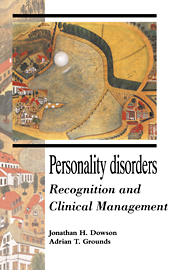Book contents
- Frontmatter
- Contents
- Acknowledgement
- Part One Recognition
- 1 Personality disorders: basic concepts and clinical overview
- 2 Specified personality disorders: clinical features
- 3 Personality disorders: less specific clinical presentations and epidemiology
- 4 Longitudinal aspects of personality disorders
- 5 Assessment of personality disorders
- Part two Clinical management
- References
- Index
4 - Longitudinal aspects of personality disorders
from Part One - Recognition
Published online by Cambridge University Press: 19 October 2009
- Frontmatter
- Contents
- Acknowledgement
- Part One Recognition
- 1 Personality disorders: basic concepts and clinical overview
- 2 Specified personality disorders: clinical features
- 3 Personality disorders: less specific clinical presentations and epidemiology
- 4 Longitudinal aspects of personality disorders
- 5 Assessment of personality disorders
- Part two Clinical management
- References
- Index
Summary
Introduction
The longitudinal perspective
The course of a disorder is examined by data collection at a minimum of two points in time, but an assessment on several occasions is required to identify a fluctuating course; if only two sets of data are available, their comparison is merely an outcome study. Many variables affect the course of PDs, including various interventions, other co-occurring disorders and secondary effects, such as a break-up of family relationships or the loss of employment.
The evaluation of the course of PDs is adversely affected by the complexity of PD assessment, so that even if a detailed evaluation has been carried out at one time-point, it may be difficult to obtain the subject's cooperation for further time-consuming interviews. Consequently, most longitudinal studies of PD have relied on relatively crude measures such as re-admission rates and suicide. Also, a high drop-out rate is a problem in any longitudinal study and, in relation to PD, has been associated with males and a diagnosis of antisocial PD.
Most PD traits appear to have a dimensional relationship with aspects of ‘normal’ personality in non-clinical populations, and it has been shown that several such traits show stability for the decades over the age of 30 (Zuckerman, 1991).
- Type
- Chapter
- Information
- Personality DisordersRecognition and Clinical Management, pp. 159 - 194Publisher: Cambridge University PressPrint publication year: 1995



